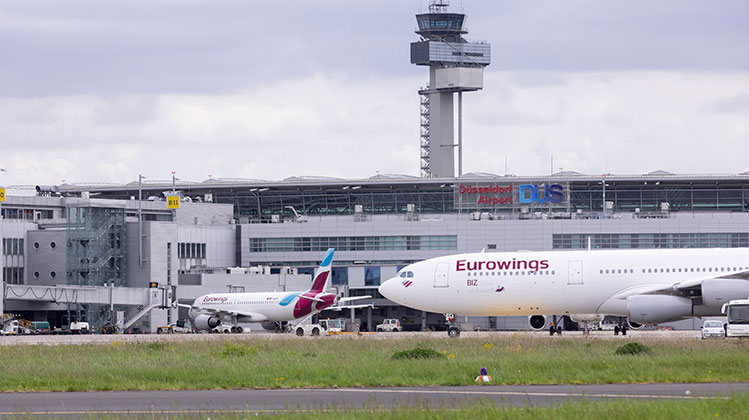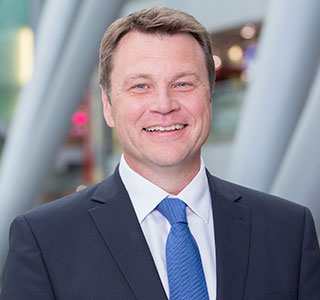Thomas Schnalke, CEO Düsseldorf Airport, interviewed by Ross Falconer.

Thomas Schnalke, CEO Düsseldorf Airport: “Today, the range of routes is back to the pre-Air Berlin bankruptcy level. Indeed, Eurowings, Europe’s fastest-growing airline, has stationed a large part of its fleet in Düsseldorf.”
Düsseldorf Airport is the largest in North-Rhine Westphalia (NRW), with a 60% market share, and gateway to the world for the most populated German federal state. The airport is an international trading centre for people and goods, for know-how, ideas, technical and cultural inspirations, and an important economic factor. Located at the heart of one of Europe’s strongest economic regions, and serving 200 destinations in 50 countries, Düsseldorf Airport plays a significant role in meeting the mobility needs of NRW’s citizens and economy.
“Air traffic has a positive effect on the labour market and facilitates economic growth,” says Thomas Schnalke, CEO Düsseldorf Airport. “Düsseldorf’s success in bringing top companies to the area – such as Mitsubishi Electric, Huawei, Kyocera, LG or 3M – is related to the airport’s proximity. Düsseldorf Airport helps create a targeted network of economic zones – for example through intercontinental air traffic, with non-stop connections to New York, Atlanta, Chicago, Dubai, Tokyo, and Abu Dhabi. Nearly 100 weekly long-haul flights to up to 25 intercontinental destinations connect NRW to the world.”

Thomas Schnalke, CEO Düsseldorf Airport: “Air traffic has a positive effect on the labour market and facilitates economic growth. Düsseldorf’s success in bringing top companies to the area – such as Mitsubishi Electric, Huawei, Kyocera, LG or 3M – is related to the airport’s proximity.”
Düsseldorf Airport City underlines the airport’s support for businesses in the region. The modern office and business park is located on a 23-hectare area close to the terminal. Almost all of the properties are occupied, and there are plans to further expand the business park by five hectares.
Meanwhile, traffic is also growing. The airport achieved its eighth consecutive record in 2017, handling 24.6 million passengers and exceeding the previous year’s growth rate of 4.8%. Impressively, it remains on its existing growth trajectory despite the bankruptcy of its biggest airline partner Air Berlin, which led to the loss of over 30% of all flights.
“Thanks to intense discussions with airline partners, the loss was addressed within six months and, today, the range of routes is back to the pre-Air Berlin bankruptcy level,” Schnalke explains. “Indeed, Eurowings, Europe’s fastest-growing airline, has stationed the largest part of its fleet in Düsseldorf.”
Carbon reduction and electric mobility
A commitment to environmental sustainability is at the heart of Düsseldorf Airport’s development strategy. It is accredited at Level 3 Optimisation of ACI’s Airport Carbon Accreditation, and has already reached its target of reducing CO2 emissions to 2.55 kilograms per traffic unit, which was originally planned by 2020. Indeed, Schnalke comments that the airport has even exceeded that goal.
“That means our carbon reduction initiatives have been successful. For example, the airport operates a solar plant, an absorption chiller, and two cogeneration units. Meanwhile, in 2019 the airport will be connected to the district heating grid of Düsseldorf. The terminal and other buildings will then use climate-neutral heat. Fine dust and nitrogen oxide emissions will be reduced noticeably, and carbon emissions will decrease by 70%.”
The airport is also increasingly relying on electric mobility, with over 30 electrically-powered vehicles to be operational onsite by 2020. Added to this will be increased use of LED lighting, and optimisation of the terminal’s air conditioning.
“Düsseldorf Airport is an example of a successful Public-Private Partnership, as it is one of the most economically successful airports in all of Europe,” Schnalke adds. “Thanks to its effective and lean structure, Düsseldorf Airport can react quickly and flexibly to the demands of the market.”







